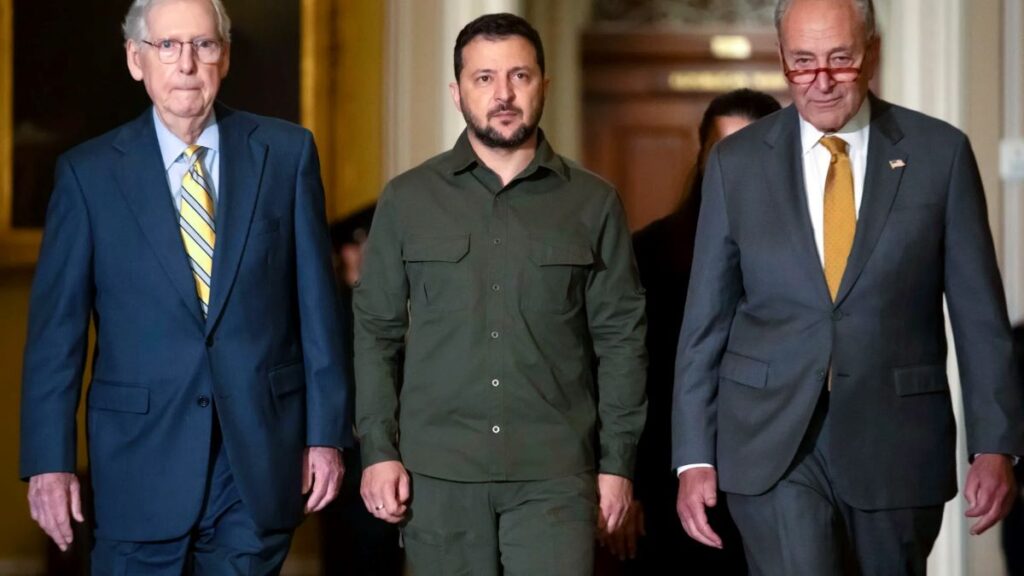
At an international security summit held in Munich, a Republican critic of fresh U.S. aid to Ukraine voiced skepticism on Sunday, contending that the proposed package awaiting approval in Congress would fail to “fundamentally alter the situation” on the ground and positing that Russia has a vested interest in pursuing peace negotiations.
The Ukrainian President, Volodymyr Zelenskyy, U.S. Vice President Kamala Harris, and other dignitaries have been urging the passage of a $60 billion aid package at the Munich Security Conference. This call coincided with Ukraine’s withdrawal of troops from the eastern city of Avdiivka after enduring months of intense conflict.
However, Sen. JD Vance, an Ohio Republican and a staunch ally of Donald Trump raised doubts, asserting that “the issue in Ukraine … is the absence of a clear endpoint” and that the U.S. lacks the industrial capacity to sustain conflicts in Eastern Europe, the Middle East, and “potentially a scenario in East Asia.”
House Speaker Mike Johnson has firmly stated his reluctance to hastily greenlight the Senate’s $95.3 billion foreign aid bill, which encompasses assistance for Ukraine, despite strong backing from the majority of Democrats and nearly half of the Republicans.
ALSO READ: “We Have to Get This Done Now!” Rep Pushes for Ukraine Aid Days After Visiting the Country
Vance emphasized, “The passage of this package will not significantly alter the situation on the battleground,” citing the constraints of American manufacturing capacity. “Are we capable of supplying the same level of armament we have been providing over the past 18 months? The answer is a resounding no. No matter the number of checks Congress issues, our capacity is limited.”
He advocated for the pursuit of a negotiated peace, contending that all stakeholders, including Russia, Ukraine, Europe, and the U.S., stand to benefit from initiating talks, suggesting that the two-year-old conflict will eventually culminate in a negotiated settlement.
“Can we send the level of weaponry we’ve sent for the last 18 months?” he asked. “We simply cannot. No matter how many checks the U.S. Congress writes, we are limited there.”
POLL—Should the U.S. Government Create a Path to Citizenship for Undocumented Immigrants?
“I think what’s reasonable to accomplish is some negotiated peace,” he said, arguing that Russia, Ukraine, Europe, and the U.S. all have the incentive to come to the table now and that the two-year-old will eventually end in a negotiated peace.
In response, Ricarda Lang, a co-leader of Germany’s Green Party, rebuffed Vance’s optimism, asserting that Russian President Vladimir Putin has consistently demonstrated “a lack of interest in peace at present.” Halting arms shipments to Ukraine now, she argued, would result in either prolonging the conflict or conceding victory to Putin.
Lang warned against the ramifications of a potential Putin triumph, cautioning that it would embolden other actors like China and erode global security and freedom. Vance, alongside a cohort of U.S. lawmakers, attended the Munich conference, although he did not participate in the meeting between Zelenskyy and several of his Senate counterparts.
ALSO READ: David Cameron Urges Swift Passage of Ukraine Aid, Warns US Against Displaying Weakness
Senate Foreign Relations Committee Chairman Ben Cardin, a Democrat from Maryland, underscored Zelenskyy’s plea for American support, underscoring the Ukrainian leader’s commitment to utilizing aid effectively.
Republican senators remain deeply divided on the issue of Ukraine, reflecting broader political fractures within the U.S. legislative landscape.
You Might Also Like:
Rep. Marjorie Taylor Greene Blasts HBO’s Latest Episode of “Curb Your Enthusiasm”
Hillary Clinton Warns Against Trump’s Reelection, Claims He Will Withdraw US From NATO
Trump Attorney Accuses Prosecutor of Perjury During Disqualification Hearing
“I Don’t Think He Should Be President,” Nikki Haley Condemns Trump Ahead of State’s Primary
Nikki Haley Warns Trump’s Court Cases Will Doom Republicans in the Coming Elections
